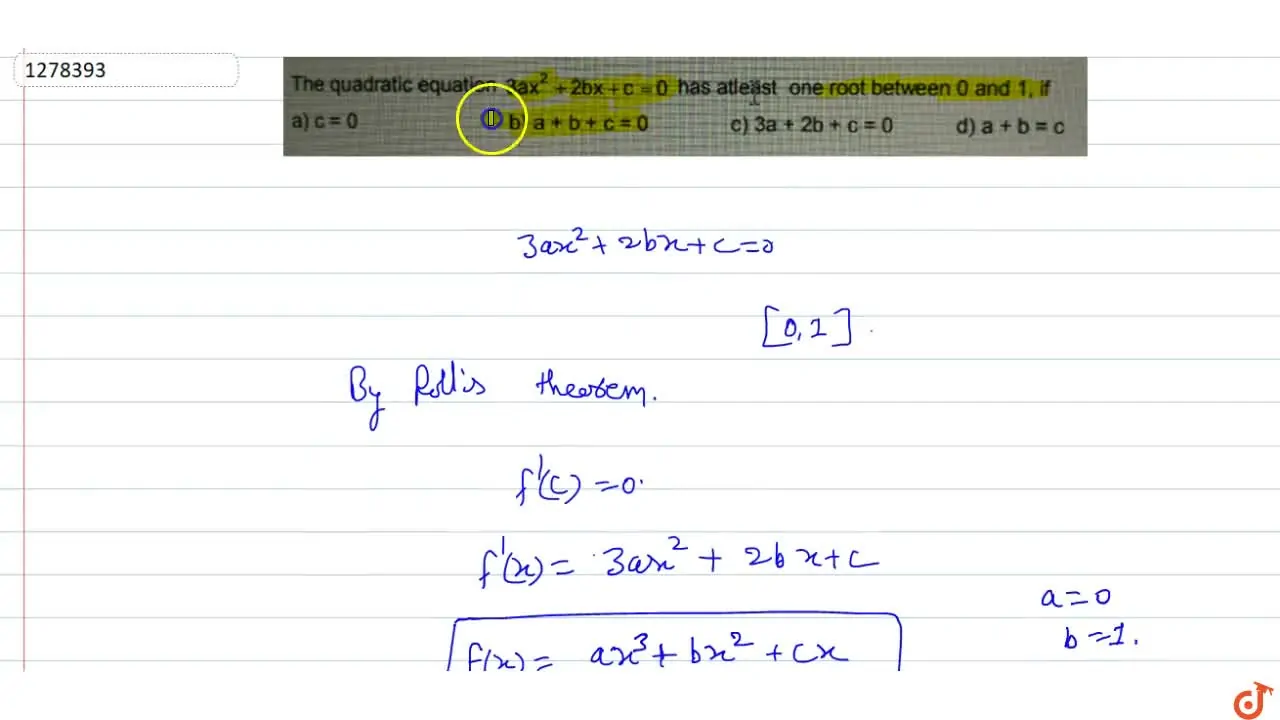he quadratic equation has atleast one root between 0 and 1, if
at least one root in (0,1)
one root in (2,3) and the other in
imaginary roots
None of the above
The correct Answer is:A
Let
f is continuous in the closed interval [0,1] and f is derivable in the open interval (0,1).
Also
By Rolle's theorem
Now,
Eq. (i) has exist atleast one root in the interval (0,1). Thus f'(x) must have root in the interval (0,1) or lias root
Related Playlists
- BOOK - IIT JEE PREVIOUS YEARCHAPTER - THEORY OF EQUATIONSEXERCISE - GROPH OF QUADRATIC EXPRESSION12videos
THEORY OF EQUATIONS
- BOOK - IIT JEE PREVIOUS YEARCHAPTER - STRAIGHT LINE AND PAIR OF STRAIGHT LINESEXERCISE - GENERAL EQUATION OF PAIR OF STRAIGHT LINES (Objective Questions I) (Only one correct option)1videos
STRAIGHT LINE AND PAIR OF STRAIGHT LINES
- BOOK - IIT JEE PREVIOUS YEARCHAPTER - TRIGONOMETRICAL EQUATIONSEXERCISE - TOPIC 3 PROBLEMS BASED ON MAXIMUM AND MINIMUM OBJECTEIVE QUESTIONS I (ONLY ONE CORRECT OPTION)9videos
TRIGONOMETRICAL EQUATIONS
Similar Questions
If a+b + c = 0, then show that the quadratic equation 3ax2+2bx+c=0 has at least one root in [0,1].
View SolutionIf a,b,c∈Randa+b+c=0, then the quadratic equation 3ax2+2bx+c=0 has (a) at least one root in [0,1] (b) at least one root in [1,2] (c) at least one root in [32,2] (d) none of these
View SolutionThe quadratic equation ax2+bx+c=0 has real roots if:
View SolutionIf 2a+3b+6c = 0, then show that the equation ax2+bx+c=0 has atleast one real root between 0 to 1.
View SolutionThe quadratic equation ax2+5bx+2c=0 has equal, roots if
View SolutionIf the quadratic equation ax2+bx+c=0 has −2 as one of its roots then ax+by+c=0 represents
View Solutiona,b,c,∈R,a≠0 and the quadratic equation ax2+bx+c=0 has no real roots, then which one of the following is not true?
View Solutiona,b,c∈R,a≠0 and the quadratic equationax2+bx+c=0 has no real roots, then
View SolutionIf a,b,c belong to R,a≠0, and the quadratic equation ax2+bx+c=0 has no real roots. Then , which one of the following is correct?
View SolutionIf one root of the quadratic equation ax2+bx+c=0 is double the other then which one of the following is correct?
View Solution


